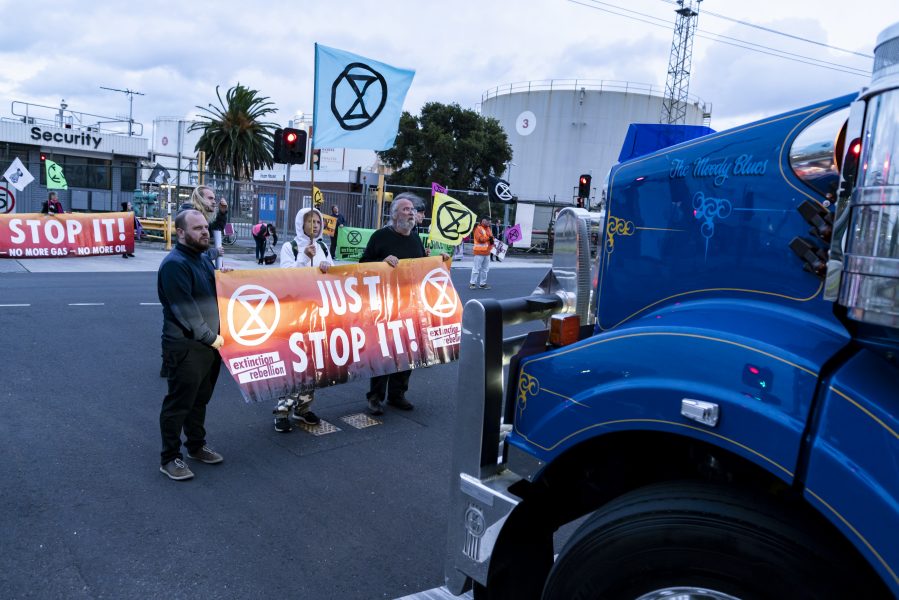An interview with Just Stop Oil protester Paul Bell

During the Just Stop Oil protests in November last year Paul Bell, an Exeter PhD student, was arrested after scaling a gantry on the M25. After spending over a month in HMP Chelmsford prison, he was recently released and is now awaiting trial. Exeposé interviewed Bell, also known as Pasha, about the experience.
Exeposé: Could you talk us through exactly what happened during the protest?
Paul Bell: I took part in direct action as a supporter of Just Stop Oil. The demand of JSO is that the Government halts all new oil and gas licensing in the United Kingdom, so there is no new oil or gas extraction. As part of the protest, I climbed a gantry over the M25, one of the busiest motorways in Europe and that caused the police to shut down my section of the motorway and that led to my arrest and subsequent incarceration. I went to court and was charged with public nuisance, which you will be hearing a lot more about due to the police crime and sentencing bill. I was refused bail and remanded in prison, so I was sent to HMP Chelmsford without trial for a month and a half.
É: Did they give a specific reason for denying bail?
PB: I really wasn’t expecting to be remanded, it was quite a shock, but the logic they used was I had other court cases going on for other forms of direct action and they thought I was likely to do it again. It felt like a politicised move trying to get peaceful protestors off the street.
É: Being arrested is not something most students have experience of, could you talk us through the process?
PB: You’re arrested by a police officer and you usually are released with police bail, or released under investigation. What can also happen is you get charged and they send you to court at the next possible opportunity. I attended court by a video link, you can request any solicitor you want and can then discuss the case. I chose to self-represent in court and pledged not guilty to the charge of public nuisance and the court remanded me, which is rare in protest cases.
É: You mentioned the controversial new Police, Crime, Sentencing and Courts Act 2022 which restricts protests and makes public nuisance a statutory offence. Do you think that has affected what happened to you?
PB: Absolutely, previously public nuisance was part of common law rather than a statutory offence, and that change was caused by numerous protests the Government wanted to shut down.
É: What would you say to people who might want to might want to get involved but are concerned about the possibilities of having a criminal record?
PB: First of all, I would like to touch on the climate crisis. We have seen 40-degree heat in the UK, wildfires, floods in Pakistan: climate change is here – and it is awful. As students we have power, so we must exercise that power. I would implore everyone who is interested to step up into activism, there is the Shell Out campaign in Exeter which would be great to get involved in and if you are interested in direct action then, of course, Just Stop Oil as well.
É: If you have only ever seen prison of television it seems like a terrible experience, could you tell us about that experience and the process going forwards?
PB: Prison is difficult, but its doable. It’s not like the movies, there are tensions and difficulties but also real moments of joy and love. I also received lots of support whilst I was in prison from people who heard what happened, but also from prison guards and fellow inmates. Going forwards, I have an ankle tag and curfew, and have to attend prison three times a week. I’m hoping to get my bail conditions adjusted because my trial is not until March 2024, which goes to show how broken the public justice system is.
É: Have you received any communication from the University?
PB: Yes the Guild reached out and offered support, as did my PhD supervisor. I’m yet to understand the full consequences with regard to my course, but I’m still currently continueing it.
É: What are the potential consequences if you’re found guilty?
PB: There are people who have pled guilty for the M25 cases already and received a sentence of 9 months, which was reduced to 6 months as they pled early, and they will only serve half. 3 months is quite serious for a protests, but that’s probably what I’ll be looking at if I’m found guilty. They will take my time on remand into account.
É: Many members of the public had responded negatively to the Just Stop Oil protests, how would you respond to those negative reactions?
PB: If people talk to me about it who are upset or were affected by my actions, its important to realise that they didn’t ask to be impacted by the protest and they need to be treated with respect and compassion. Just Stop Oil are inherently non-violent, but even beyond that its important to be kind and understand where people are coming from. As a whole, people wouldn’t be doing this if it wasn’t so important- climate change is an existential threat and so it is necessary to take action in the loudest possible way. I’ve been surprised by the extent of support I’ve received, especially in prison.


